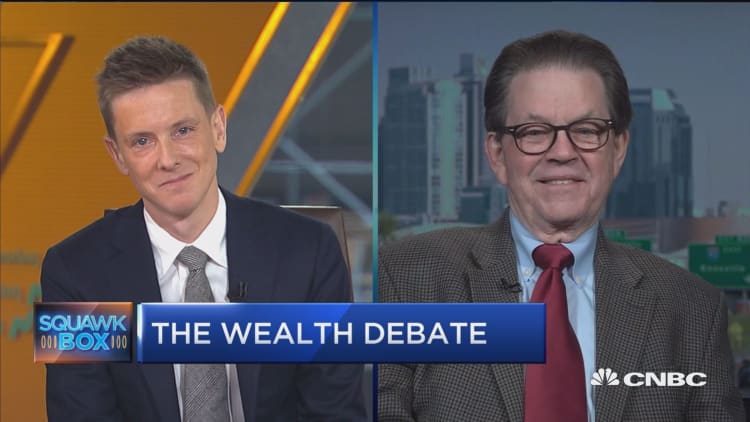
Chris Hughes, co-founder of Facebook and an advocate for wealth equality, told CNBC on Monday that he and other ultrawealthy Americans should be paying higher taxes to help make life better for everyone in society.
"We have a free-rider problem. The top 1-percent — and even more specifically the top 0.1-percent, those with household wealth above $50 million — aren't paying their fair share," said Hughes.
Hughes' argument echoes that of Sen. Elizabeth Warren, who officially launched her 2020 Democratic presidential campaign on Saturday. The Massachusetts Democrat wants to impose an annual wealth tax of 2 percent on households with assets over $50 million and 3 percent on households with assets over $1 billion. Democratic Rep. Alexandria Ocasio-Cortez, a freshman socialist firebrand from New York, wants to slap a 70 percent marginal tax rate on income above $10 million.
"As a member of that 1-percent, 0.1-percent, I can tell you, I can afford a little bit higher taxes and it would make my life better," Hughes said in a "Squawk Box" interview. "The point is clear — my taxes should be higher."
Hughes, a Harvard dormmate of co-founder and Facebook chief Mark Zuckerberg, was the early spokesperson for the social network. Hughes said he made about $500 million for three years of work. He left Facebook in 2007 to work on Barack Obama's presidential campaign.
In 2016, Hughes co-founded the Economic Security Project, an effort to explore how to provide financial security for all Americans through cash transfers. Appearing on CNBC in 2018, he said workers who make less than $50,000 per year should get a government stipend of $500 per month — paid for by raising taxes on the top 1-percent.
As a member of that 1-percent, 0.1-percent, I can tell you, I can afford a little bit higher taxes and it would make my life better.Chris HughesFacebook co-founder
However, economist Art Laffer, father of the "trickle down" policies of the Ronald Reagan presidency, disagreed with Hughes' premise that taxing the wealthy further would lead to more prosperity for lower-income Americans. "When you do wealth taxes and death taxes, it does change the incentive."
The government should pursue policies that raise folks up, "not pull other people down," said Laffer, co-author of "Trumponomics," which similarly to "Reaganomics" espouses that tax cuts on individuals and corporations spur investment and a stronger economy and job market, which benefits lower-income workers more than the rich.
We should have a low rate broad-based flat tax and then Warren Buffett would pay what he deserves.Art LafferEconomist
Appearing in the same CNBC interview as Hughes, Laffer also took a shot at the Facebook co-founder, saying if he wants to pay more taxes, just pay them. "I have no problem with you sending a check to the government, if that's what you want to do with your money," Laffer told Hughes, who responded by smiling. "We should have a low rate broad-based flat tax and then Warren Buffett would pay what he deserves," Laffer added.
In saying he should pay higher taxes, Hughes sounded like Buffett. The billionaire investor has long called for wealthier Americans to pay higher tax rates, pointing out over the years during Democratic and Republican administrations that he pays a lower rate than his office employees because most of his income comes from capital gains.
WATCH: Tax the rich: What Democrats' plans could mean for growth, spending and inequality




